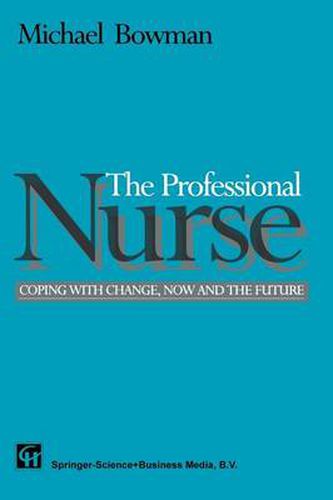Readings Newsletter
Become a Readings Member to make your shopping experience even easier.
Sign in or sign up for free!
You’re not far away from qualifying for FREE standard shipping within Australia
You’ve qualified for FREE standard shipping within Australia
The cart is loading…






This title is printed to order. This book may have been self-published. If so, we cannot guarantee the quality of the content. In the main most books will have gone through the editing process however some may not. We therefore suggest that you be aware of this before ordering this book. If in doubt check either the author or publisher’s details as we are unable to accept any returns unless they are faulty. Please contact us if you have any questions.
Michael Bowman’s book forms a useful reference source for Health Service staff interested in the role of the professional nurse and the dis charge of professional accountability. I am delighted that this work competently deals with nursing’s dilemmas about its therapeutic role over a crucial period in its history, especially the effects of major structural change on the profession between the period from the implementation of the Salmon and Mayston Reports up to the present time and Project 2000. The picture is in Dr Bowman’s opinion not a very happy one from the viewpoint of the profession. Some of the changes that have taken place have involved some loss of professional cohesion and were independent of the organizational framework of the National Health Service. Nevertheless, it is disturbing that nurses appear during the period covered to have Ilad a quite inadequate input to the shaping of Health Policy. There are already signs that the nursing profession has begun to absorb the warnings ci ted in Dr Bowman’s study. However, in the wake ofthe National Health Service reforms and the implementing of a business culture in the National Health Service, nurses may find the message of this book only too familiar. That does not for one moment mean that the nursing input to corporate strategy and general direction should be defensive or reactionary. British nursing continues to be highly regarded by the general public.
$9.00 standard shipping within Australia
FREE standard shipping within Australia for orders over $100.00
Express & International shipping calculated at checkout
This title is printed to order. This book may have been self-published. If so, we cannot guarantee the quality of the content. In the main most books will have gone through the editing process however some may not. We therefore suggest that you be aware of this before ordering this book. If in doubt check either the author or publisher’s details as we are unable to accept any returns unless they are faulty. Please contact us if you have any questions.
Michael Bowman’s book forms a useful reference source for Health Service staff interested in the role of the professional nurse and the dis charge of professional accountability. I am delighted that this work competently deals with nursing’s dilemmas about its therapeutic role over a crucial period in its history, especially the effects of major structural change on the profession between the period from the implementation of the Salmon and Mayston Reports up to the present time and Project 2000. The picture is in Dr Bowman’s opinion not a very happy one from the viewpoint of the profession. Some of the changes that have taken place have involved some loss of professional cohesion and were independent of the organizational framework of the National Health Service. Nevertheless, it is disturbing that nurses appear during the period covered to have Ilad a quite inadequate input to the shaping of Health Policy. There are already signs that the nursing profession has begun to absorb the warnings ci ted in Dr Bowman’s study. However, in the wake ofthe National Health Service reforms and the implementing of a business culture in the National Health Service, nurses may find the message of this book only too familiar. That does not for one moment mean that the nursing input to corporate strategy and general direction should be defensive or reactionary. British nursing continues to be highly regarded by the general public.